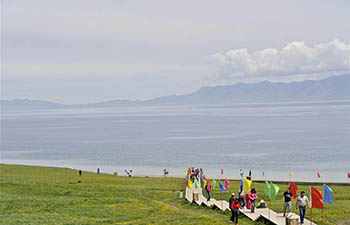SAN FRANCISCO, June 3 (Xinhua) -- A group of 14 researchers have called for their colleagues to share computer code related to their research.
The researchers, from universities across the United States and Europe, recently published a commentary in Nature Science, which has announced a pilot project to ask future authors to make their code available for review.
Members of the science community have discussed for years whether and how to share data from painstaking research and costly experiments, while some academic journals are turning their attention to another aspect of the research process: computer programming code.
Code is becoming increasingly important in research because researchers are often writing their own computer programs to interpret their data.
Ben Marwick, University of Washington (UW) associate professor of anthropology, is one of the authors of the Nature Science commentary, titled "Toward standard practices for sharing computer code and programs in neuroscience."
Making the programs behind the research accessible allows their colleagues to test the code and reproduce the computations in an experiment -- in other words, to reproduce results and solidify findings.
It's the "how the sausage is made" part of research, said Marwick. It also allows the code to be used by other researchers in new studies, making it easier for researchers to build on the work of their colleagues.
"What we're missing is the convention of sharing code or the tools for turning data into useful discoveries or information," Marwick was quoted as saying in a news release from UW.
"Researchers say it's great to have the data available in a paper -- increasingly raw data are available in supplementary files or specialized online repositories -- but the code for performing the clever analyses in between the raw data and the published figures and tables are still inaccessible."
The Nature Neuroscience pilot focuses on three elements: whether the code supporting an author's main claims is publicly accessible; whether the code functions without mistakes; and whether it produces the results cited.
Nature Publishing Group, the company behind Nature Research journals, has encouraged writers to make their code available upon request since 2014.
Currently, besides Nature Neuroscience, other Nature Research journals, such as Nature Methods and Nature Biotechnology, provide for code review as part of the article evaluation process.
"This is a commitment from a high-impact journal to raise software to the status of a regular research product," Marwick said about the Nature Neuroscience project.
"In the future, scientific disciplines will be shifting to a position where you need to share your code as well as your data. It will be easier to reproduce someone's new discovery, and incorporate their discoveries into your own work."

















